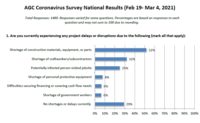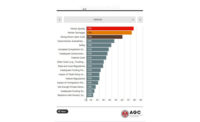Some 60% of highway contractors reported motor vehicles had crashed into construction work zones during the past year, putting motorists and workers at risk, say results of a highway work zone safety study conducted by the Associated General Contractors of America and site technology provider HCSS.
"More troubling, 30% of firms experiencing these kinds of crashes reported they happened five or more times during the past 12 months," said Ken Simonson, AGC chief economist, in announcing the findings.
About 3% of respondents reported one fatality resulting from crashes and 1% reported two. The association received surveys from 292 member contractors.
In looking at impacts to safety in highway work zones due to changes in highway traffic levels since the pandemic began, 32% of those surveyed said it made the work zones safer, 28% said they were less safe and another third said driving levels during the pandemic created no change.
In the previous iteration of the annual survey, 68% of a slightly smaller group of 200 AGC member respondents who are highway contractors reported at least one job site crash in 2019.
Simonson said the New York AGC chapter is urging state legislators to pass a law that would allow use of speed cameras on highway construction projects, better training and other policies to help educate motorists in safety.
"As a software company, we believe technology could and should play a role to enhance safety in our work zones," said Steve McGough, president and CFO of HCSS. "Mobile barriers enable positive protection between workers and motorists. That has shown a lot of promise in the smart work zone specifically to cue warning systems."
Amy Hall, president of Ebony Construction in Sylvania, Ohio, said the firm submitted comments in early May to the Federal Highway Administration to update the Manual on Uniform Traffic Control Devices, a guidance sent to states to assist in proper installation and management of traffic control devices. The manual's last major update was in 2012.
Technology, positive protection barriers, the presence of police in work zones, new laws and policy guidance can all help boost site safety, but responsibility ultimately lies with individual motorists, especially those going on road trips over the Memorial Day holiday weekend, according to highway contractors on the AGC conference call.
"As a construction owner, we are asking people to just be aware," Hall says. "Let's be aware, let's slow down and let's keep everybody safe. For the drivers and the folks in their cars, as well as the people who are working on the highways. Let's improve everyone's life and improve the efficiency of what is one of the most integral backbones of our nation, the highway transportation system."






Post a comment to this article
Report Abusive Comment